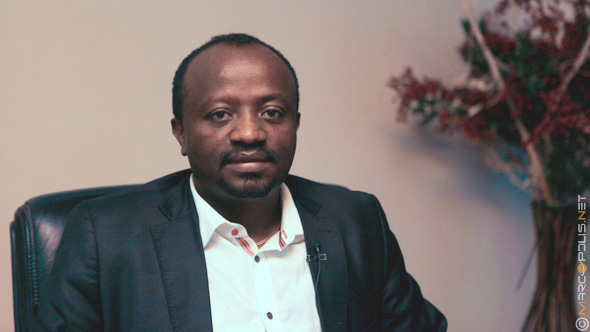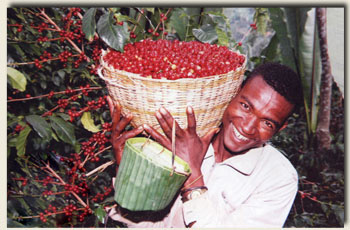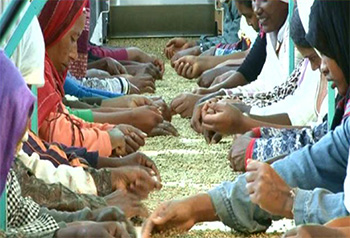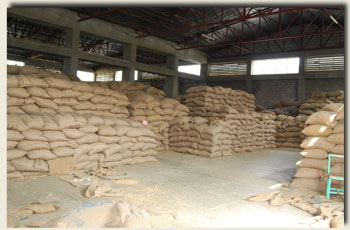Organic coffee from Ethiopia: Aleta Land Coffee
Habtamu Silla, General Manager of Aleta Land Coffee
“Our family has been in the coffee business for over 14 years. We have coffee washing stations, farms and sun drying coffee factories, so we really know about the coffee that we grow. Our coffee is organic and of excellent quality,” asserts Mr Silla. Established in 2005, Aleta Land Coffee exports organic coffee to the US, Europe, Asia (Japan) and the Middle East.
Interview with Habtamu Silla, General Manager of Aleta Land Coffee

Could you begin by telling us a little bit about the history of Aleta Land Coffee and how it became one of the leading Ethiopian exporters of coffee?
Aleta Land Coffee was established in 2005, before that we had been a coffee supplier to the central market. Since we established our company we have been exporting coffee to many countries such as America, Japan, Europe, Asia and the Middle East. Gradually our company has been growing and growing. Our export value and volume has increased every year. We now have many foreign customers who appreciate our organic coffee.
Is the company involved in the growing of coffee or is it just involved in the purchasing of contracts from the Ethiopian Commodity Exchange (ECX)?
We are in the coffee supply business. We have a farms and washing stations in Sidamo and Yirga Chaffee. And we also have a farm in Kaffa which is a region of Ethiopia and is the birthplace of coffee. The name coffee derives from the name of the region Kaffa.
Do you also deal in purchasing some contracts from the Ethiopian Commodity Exchange (ECX) as well?
 No. The ECX do not give us contracts; we supply the coffee and they facilitate the access to the buyers.
No. The ECX do not give us contracts; we supply the coffee and they facilitate the access to the buyers.
We understand that Aleta Land Coffee is one of the founders of the Ethiopian Commodity Exchange, what is your relationship with the ECX and do you still have an equity in the ECX?
Yes, as you said we are the founder of the Ethiopian Commodity Exchange. We are a full member. We have a seat and we use it to buy and sell coffee.
The coffee business has been a very competitive commodity business. How do you stay ahead of the competition especially from coffee growers in South America?
Our family has been in the coffee business for over 14 years. We have coffee washing stations, farms and sun drying coffee factories, so we really know about the coffee that we grow. Our coffee is organic and of excellent quality. We sell our organic coffee at a better price. We expect a better price from the buyers because our coffee is organic and special. We still don’t get the prices that we would wish for, but we are working on getting a better price. We need to add value to our export organic coffee, and that is part of our future plan. I think that we will do better and get a better price in the future.
Our family has been in the coffee business for over 14 years. We have coffee washing stations, farms and sun drying coffee factories, so we really know about the coffee that we grow. Our coffee is organic and of excellent quality.
What has been Aleta Land Coffee’s annual growth since 2005?
Our company has been growing by more than 30% per year.
Are you expanding into other markets around the world and are you expanding into other commodities besides coffee?
Yes, we are planning to export sesame seeds to China and Asia. There is a very big demand for sesame seeds in Asia. We have carried out our study on the sesame market and so this year we shall also export sesame seeds.
Coffee is an international commodity that is traded on many exchanges around the world which I’m sure you are aware of. Do you have any relationship in terms of pricing with other exchanges around the world, for example the Chicago Mercantile Exchange?
The coffee market depends on the New York Exchange. We do consider the New York Exchange but the price can go up and down, it depends on the quality and grade. If the New York exchange says 100 we can sell at 200 because we have good quality coffee.
Does Aleta Land Coffee have any agreements with the big brands such as Dunkin Donuts or Starbucks?
Yes, we do business with Starbucks. We have already sold some coffee to Starbucks and I think that we will do more business with them with the next crop. Starbucks do also offer a speciality, premium coffee and so we are discussing how we can work together on that.  Two years ago Starbucks was refused a patent right on Ethiopian coffee and there was an issue with the Ethiopian government. Now thanks to the Ethiopian government, Starbucks has started buying our coffee again and they have accepted our brand name now, before they didn’t use our name on their packaging but now they do. This year we have sold more than 200 tonnes of coffee to Starbucks.
Two years ago Starbucks was refused a patent right on Ethiopian coffee and there was an issue with the Ethiopian government. Now thanks to the Ethiopian government, Starbucks has started buying our coffee again and they have accepted our brand name now, before they didn’t use our name on their packaging but now they do. This year we have sold more than 200 tonnes of coffee to Starbucks.
Are you pursuing any other brands such as Dunkin Donuts to begin purchasing your coffee?
We have several types of coffee, depending on the region where it is grown. So we can prepare the coffee depending on the buyers’ interests or costs. Our coffee is organic, and it is different from the coffee in Brazil or other countries. We are going to have commercial organic coffee farms in the future but until then we only have small coffee farms. In Brazil, they produce a huge amount of coffee on huge commercial farms and this entails using fertiliser etc. The production process, quality, taste and aroma of our organic coffee is different and so we have to demand a better price.
How does your coffee pricing compare to coffee in Brazil or South America?
We are more expensive than Brazil or Colombia, we are trading at 20% or 30% more than those countries. The buyers want our organic coffee and so we can sell at a better price.
 Why should people buy your organic coffee? What makes you different to other suppliers around the world?
Why should people buy your organic coffee? What makes you different to other suppliers around the world?
As I said we have a farm in Kaffa so we can supply Kaffa speciality coffee. We also have a washing stations in Sidamo and Yirga Chaffee so we can supply speciality Sidamo and Yirga Chaffee coffee. If you go to Korea or Japan, our brand is now very well known for our speciality coffee. They give us a good price and we give them good quality.
Where do you export the most coffee?
Previously we used to export mostly to Europe, but this year we have exported mainly to Japan and South Korea.
The USA is a big market, do you have a footprint on the US market?
Yes, we do export to the US but not as much as we have done to Japan. We exported more than 60% of our entire exports to Japan this year.
The USA is one of the biggest coffee markets in the world, what kind of marketing strategies or tools are you using to gain market share in the US?
In the US, some companies want special coffee and others want low grade coffee. Starbucks would like to have special coffee but if they want quality they have to pay us a good price for it. Japanese companies give us a better price than Starbucks so we prefer to sell coffee to Japan. We don’t get what we deserve from Starbucks in the American market. We are still looking for a better price from them because we deserve it as an organic coffee producing country. We are looking to penetrate the valued coffee market. The government is supporting that and I think we will achieve it in the near future.
FAIR USE POLICY
This material (including media content) may not be published, broadcasted, rewritten, or redistributed. However, linking directly to the page (including the source, i.e. Marcopolis.net) is permitted and encouraged.